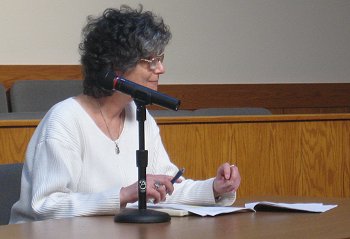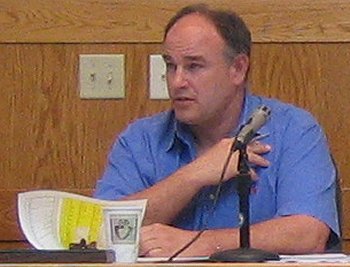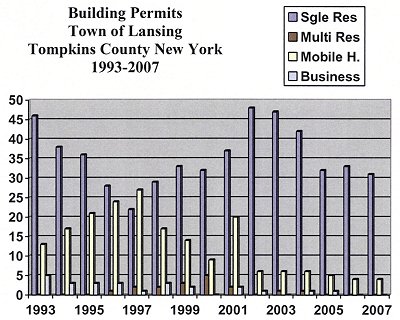- By Dan Veaner
- News
 Print
Print
The underlying issues in the controversy raised by proposed changes to Lansing's zoning ordinances were aired in a public hearing at the Town Hall Wednesday. At the heart of the dispute is the Town Board proposal to apply plans that are straightforward and simple to a checklist. If the plans do not exceed defined benchmarks they would be issued a permit by the Planning Office instead of having to be subject to a full Planning Board review. Planning Board members and some others have been vociferously opposed to removing any part of the review process from their bailiwick, while Town Board members insist that a streamlined process will encourage businesses to locate in Lansing.
"My opinion is that this is a control issue," said Deputy Town Supervisor Connie Wilcox. "We'd like to let the taxpayers, the homeowners, the businesses have more control of their own destiny instead of the Planning Board."

Marcy Rosenkrantz objecting to what she calls radical changes in
Lansing's zoning ordinance
The Planning Board, at the Town Board's request, submitted over a hundred proposed changes to the town zoning ordinance, which the Town Board has reviewed and revised at length. At Wednesday's hearing the public was presented with a 16 page chart of 91 items. Each item has to be considered for each of eight land uses, or zoning categories such as Industrial/Research, Commercial/General, Commercial Mixed Use, or Rural/Agricultural, meaning a total of 728 decisions on what process should be used for each.
"I ran my campaign to try to promote businesses in the town," said Town Supervisor Scott Pinney. "I know when businesses move into the town it has an effect on the neighbors. The influence I had on this was to promote lower impact businesses, to make the process more streamlined to bring them to the town. That's where the in-house site plan comes in. We're trying to make it lower impact."
Marcy Rosenkrantz, former teacher who owns a raspberry farm with her husband Dan Konowalow, a Lansing Zoning Board of Appeals member, spoke against the changes, challenging the Town Board to present evidence that the Planning Board has actually caused businesses to locate elsewhere. Pinney presented a chart showing no new business building permits applied for in the past few years. "That just tells me that there is a low number," Rosenkrantz said. "It doesn't tell me how many applied and were denied permits."

Town Supervisor Scott Pinney
"Either way they are very low numbers," Pinney replied. "We're trying to encourage this without spending taxpayers money to bring businesses into town. People talked about tax breaks and these other things. If you take the retail sales from an industrial/agricultural equipment company, you have an in-house site plan for a Rural Agricultural area. In my opinion we should want that business in that area. But that in-house site plan also states that if they disturb more than an acre it kicks it into a full site plan review (by the Planning Board)."
Rosenkrantz strongly objected to in-house site plans on the grounds that if a neighbor's plan passed the check list she would not be informed until after the fact, in effect losing her change to influence the possible impact on her property. She chastised the Town Board for not replacing Planning Board members who they view as intimidating property owners. "I think this is a radical change," she said. "I can see a lot of downside risk and aggravation for people who have already gone through the process. I hope you will reconsider and not pass this without a lot of evidence that the current process is actually discouraging. Specific evidence besides people being intimidated."
But other residents supported the changes. "I am all in favor of streamlining," said Charlie Purcell. "It's all about I don't want my neighbor to do this or I don't want my neighbor to do that. We lose the idea of what I want my neighbor to have. If it is an acceptable use I don't have a problem with that."
"As far as I can remember the Town Board has consisted of people running on the Republican ticket," noted Claes Nyberg. "To me, being a Republican means that you stand for freedom of the individual and less government interference. Now there is no freedom for the individual to decide things. You have to go before a bunch of strangers that you don't know, and if they decide something there is nothing you can do about it."

(Left to right) Deputy Supervisor Connie Wilcox,
Councilmen Marty Christopher, Bud Shattuck
"That's part of our reason to want to change this ordinance," replied Wilcox. "To make those things simpler for the public so they can just go to the Code Enforcement Office and say 'this is what I want to do.' You can get a permit, you can go about your business and do it. We're trying to simplify it for everybody. Not just business owners, but for John Q. Public who wants to put up a house or a garage or a car port."
"The Planning Board is very powerful," Nyberg said. "There is something wrong when the public is affected by their decisions and can't do anything about it. They can't do it at the polls or any other way."
"There is one other way," Christopher noted. "People like yourself can submit your resume to us, and say you would like to be on the Planning Board. It is very difficult for us to get people who want to serve in that capacity."

Chart prepared from Town of Lansing Records by Planning
Board member Larry Zuidema earlier this month
"The unfortunate part is that there are not very many people like you who will speak up and say that is how you feel about it," Wilcox told Nyberg. "A lot of people feel that if they do speak up like that there may be retribution in the end. So I appreciate your standing up and sharing your comments."
Exacerbating the disagreement is a long-time and escalating inability for the Town and Planning Boards to communicate. Each complains that the other doesn't listen to them, and frequently ideas are rejected because they are taken as slights or insults, so that the substance is never addressed. "We've been trying to do some of the things that you have suggested for the past three or four years," noted councilman Marty Christopher. "It hasn't just surfaced now. None of what we're doing now is new. It's old stuff that kept grinding and grinding and never got done. Obviously this is our last resort."
Despite the communication failures, the boards will try to come to a consensus at 6:45 on April 23rd in the Lansing Town Hall as they try to resolve the many items on the chart they disagree on. Pinney encouraged the public to sit in on that meeting to get a better perspective of both sides of the issue.
----
v4i16
"My opinion is that this is a control issue," said Deputy Town Supervisor Connie Wilcox. "We'd like to let the taxpayers, the homeowners, the businesses have more control of their own destiny instead of the Planning Board."

Marcy Rosenkrantz objecting to what she calls radical changes in
Lansing's zoning ordinance
The Planning Board, at the Town Board's request, submitted over a hundred proposed changes to the town zoning ordinance, which the Town Board has reviewed and revised at length. At Wednesday's hearing the public was presented with a 16 page chart of 91 items. Each item has to be considered for each of eight land uses, or zoning categories such as Industrial/Research, Commercial/General, Commercial Mixed Use, or Rural/Agricultural, meaning a total of 728 decisions on what process should be used for each.
"I ran my campaign to try to promote businesses in the town," said Town Supervisor Scott Pinney. "I know when businesses move into the town it has an effect on the neighbors. The influence I had on this was to promote lower impact businesses, to make the process more streamlined to bring them to the town. That's where the in-house site plan comes in. We're trying to make it lower impact."
Marcy Rosenkrantz, former teacher who owns a raspberry farm with her husband Dan Konowalow, a Lansing Zoning Board of Appeals member, spoke against the changes, challenging the Town Board to present evidence that the Planning Board has actually caused businesses to locate elsewhere. Pinney presented a chart showing no new business building permits applied for in the past few years. "That just tells me that there is a low number," Rosenkrantz said. "It doesn't tell me how many applied and were denied permits."

Town Supervisor Scott Pinney
"Either way they are very low numbers," Pinney replied. "We're trying to encourage this without spending taxpayers money to bring businesses into town. People talked about tax breaks and these other things. If you take the retail sales from an industrial/agricultural equipment company, you have an in-house site plan for a Rural Agricultural area. In my opinion we should want that business in that area. But that in-house site plan also states that if they disturb more than an acre it kicks it into a full site plan review (by the Planning Board)."
Rosenkrantz strongly objected to in-house site plans on the grounds that if a neighbor's plan passed the check list she would not be informed until after the fact, in effect losing her change to influence the possible impact on her property. She chastised the Town Board for not replacing Planning Board members who they view as intimidating property owners. "I think this is a radical change," she said. "I can see a lot of downside risk and aggravation for people who have already gone through the process. I hope you will reconsider and not pass this without a lot of evidence that the current process is actually discouraging. Specific evidence besides people being intimidated."
But other residents supported the changes. "I am all in favor of streamlining," said Charlie Purcell. "It's all about I don't want my neighbor to do this or I don't want my neighbor to do that. We lose the idea of what I want my neighbor to have. If it is an acceptable use I don't have a problem with that."
"As far as I can remember the Town Board has consisted of people running on the Republican ticket," noted Claes Nyberg. "To me, being a Republican means that you stand for freedom of the individual and less government interference. Now there is no freedom for the individual to decide things. You have to go before a bunch of strangers that you don't know, and if they decide something there is nothing you can do about it."

(Left to right) Deputy Supervisor Connie Wilcox,
Councilmen Marty Christopher, Bud Shattuck
"That's part of our reason to want to change this ordinance," replied Wilcox. "To make those things simpler for the public so they can just go to the Code Enforcement Office and say 'this is what I want to do.' You can get a permit, you can go about your business and do it. We're trying to simplify it for everybody. Not just business owners, but for John Q. Public who wants to put up a house or a garage or a car port."
"The Planning Board is very powerful," Nyberg said. "There is something wrong when the public is affected by their decisions and can't do anything about it. They can't do it at the polls or any other way."
"There is one other way," Christopher noted. "People like yourself can submit your resume to us, and say you would like to be on the Planning Board. It is very difficult for us to get people who want to serve in that capacity."

Chart prepared from Town of Lansing Records by Planning
Board member Larry Zuidema earlier this month
"The unfortunate part is that there are not very many people like you who will speak up and say that is how you feel about it," Wilcox told Nyberg. "A lot of people feel that if they do speak up like that there may be retribution in the end. So I appreciate your standing up and sharing your comments."
Exacerbating the disagreement is a long-time and escalating inability for the Town and Planning Boards to communicate. Each complains that the other doesn't listen to them, and frequently ideas are rejected because they are taken as slights or insults, so that the substance is never addressed. "We've been trying to do some of the things that you have suggested for the past three or four years," noted councilman Marty Christopher. "It hasn't just surfaced now. None of what we're doing now is new. It's old stuff that kept grinding and grinding and never got done. Obviously this is our last resort."
Despite the communication failures, the boards will try to come to a consensus at 6:45 on April 23rd in the Lansing Town Hall as they try to resolve the many items on the chart they disagree on. Pinney encouraged the public to sit in on that meeting to get a better perspective of both sides of the issue.
----
v4i16



